Iran and the Lebanon

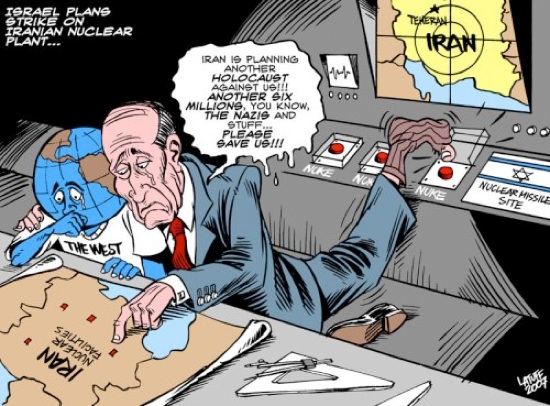
Wikimedia Commons: Carlos Latuff
Israel plans nuclear strike
One learns much about the total situation with which the Palestinians are confronted - the attitude of the States towards Israel, and the outlook of the Israelis - by considering, in brief, the crisis over the Iranian nuclear programme. Furthermore the topic is of untold importance and urgency in relation to the whole Middle East and indeed the world. Therefore although the present author is no expert on this topic a page will be given to its consideration. Something will also be said about the possibility of future Israeli aggressive intentions towards the Lebanon. Please give any feedback or correction.
Iran
The Emergency of August 2010
On 4 August 2010 a group of former American intelligence professionals (Veteran Intelligence Professionals for Sanity) wrote an open letter to President Obama on the subject of ‘War with Iran’. They commenced: ‘We write to alert you to the likelihood that Israel will attack Iran as early as this month. This would likely lead to a wider war.’ They urged Obama to ‘move quickly to pre-empt an Israeli attack by publicly condemning such a move before it happens’. Part of the context for this memo was that a resolution, H. Res.1553, had recently been introduced in the House of Representatives which spoke of American ‘support for Israel’s right to use all means necessary to confront and eliminate nuclear threats posed by Iran … including the use of military force’. The intelligence professionals argued:
(i) That senior American officials, including the president, have a misplaced trust in Netanyahu. Israelis have shown that they can surprise Americans. Given the strong support he enjoys in Congress and the fact that it is an election year in the USA Netanyahu believes that he holds the trump card.
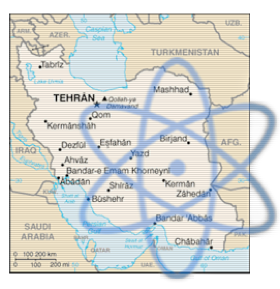
(iii) The Israelis didn’t like the recent announcement that U.S. and Iranian officials would, in September, resume talks to find a solution to the question as to how Iran may obtain low-enriched uranium (LEU) for its medical research reactor. This, together with any shipment of a large proportion of Iran’s LEU abroad (see below) would weaken Israel’s pretext for an attack on Iran. What the Israelis want is regime change in Iran.
Wikimedia Commons
Iranian Nuclear Installations
Background
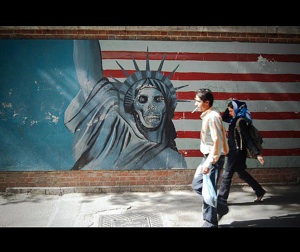
Flickr Commons:Desmond Kavanagh
The Great Satan.
Mural on the wall of the long-abandoned US embassy in Tehran.
‘What a horrible, disgusting relationship expressed so brutally.’ (Kavanagh)
Israel

Wikimedia Commons - Eileen Fleming.
Mordechai Vanunu
June 2009.
A former technician at a secret nuclear plant, Vanunu acted as a whistleblower, giving details of Israel’s nuclear arsenal to The Sunday Times. After being kidnapped by Mossad agents in Rome he was convicted and spent 18 years in Israel’s jails, much of it in solitary confinement. Released in 2004, he has spent further periods in jail (most recently being released again 08.08.10) for continuing to speak out. He has on many occasions been nominated for the Nobel peace prize.
Israel is the only state in the region that has not signed the Nuclear Non-Proliferation Treaty and the Biological and Toxin Weapons Convention. It has signed but not ratified the Comprehensive Nuclear Test-Ban Treaty and the Chemical Weapons Convention.
The Stuxnet ‘Worm’
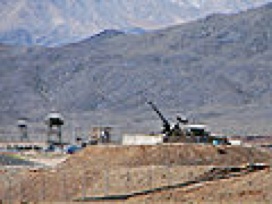
Wikimedia Commons: Hamed Saber
Anti-aircraft Guns Guarding Natanz Nuclear Facility, Iran
Might The US/Israel Attack Iran ?
One would have thought that the United States would be most unlikely to go to war with Iran.
(i) Iran is a country of some 80 million people, much of it mountainous, four times the size of Iraq. It has an army which approaches the size of the U.S. army, moreover concentrated in Iran, not spread out over many countries as is the US military. In these circumstances it is unthinkable that the States could mount a ground offensive. Apart from the southern coast of Iran, the Persian gulf, the US has no border from which it could mount such. Bombing (other than a nuclear holocaust, killing millions) could only temporarily hold back any weapons programme.
(ii) In the event of an attack using conventional weapons Iran could immediately wreak havoc with the world economy; in particular, war would have devastating consequences for the energy-hungry U.S. Iran accounts for only around 7% of internationally-traded oil. But by attacking tankers with its lethal Noor anti-ship missiles it could further block another 40% of oil coming from Iraq and the Gulf states. (Dyer). ‘In a few days insurance rates for tankers planning to enter the Gulf would become prohibitive, effectively shutting down the region’s oil exports completely.’ (Dyer).
It is thus hardly surprising to learn that, in the war games that the Pentagon’s planners have over the past decade and a half devised to mimic an attack on Iran, the US never comes out as the winner. (Dyer). One may also imagine that Obama’s style is to attempt to win others over through dialogue rather than to pursue outright aggression. We may be thankful that the prerogative to execute war lies with the executive not with the legislature in the United States. (If passed, the House of Representatives resolution referred to above would be non-binding.)
Israel by contrast may be a wild card. If Eiland is to be believed, it is precisely an Israeli perception of American lack of resolution that might lead it to take a pre-emptive strike, reckoning that, once war was joined, the States would be bound to intervene on the Israeli side. What seems alarming is the extent to which Israel is being allowed to dictate or manipulate US policy at present; it is to a frightening extent the tail wagging the dog. Meanwhile the fact that so many in the States clearly support a right-wing Israeli position may mesmerise Israelis into thinking that an attack would be condoned. Such an attack could of course lead to a wider conflagration in the Middle East. But - if they perceive the ‘only alternative’ to be living under the shadow of a nuclear Iran - who is to say that the Israelis might not risk bringing the roof down on their heads? Israel has in the past shown a marked inability to tolerate any balance of power; to conceive of themselves as one nation among others, living within their own internationally-defined legal boundaries, alongside others. Their strategy has rather consisting in making sure that they at all times have the upper hand over others who should cower before their military prowess. Psychologically anything else seems intolerable to them. That the Arab world might at present live under constant fear as to what Israel might do seems not to have occurred. It is Israel that has in recent years attacked and held Arabs in thrall, occupying their land, not vice versa.
For the present it seems clear that not only Israel but also the US has not ruled out some kind of military action. It may be thought horrifyingly significant that, during their 8-hour discussion in New York on 11 Nov. 2010, in the course of which Hillary Clinton offered a packet of inducements to Benjamin Netanyahu to prolong the moratorium on settlement building, she apparently offered Israel a gift of twenty F-35 stealth bombers worth $3 billion. The only role for these offensive weapons could be to give Israel the ability to attack Iran. There was some impression in Israel that these stealth bombers might be forthcoming in any event. (Click here.)
So Where Are We?
Fresh talks held between the five permanent members of the Security Council (the US, China, Russia, France and the UK) plus Germany and Iran in Geneva in December 2010 were inconclusive. However the group is due to meet again in Istanbul on 21/22 January 2011 (Update.) The gap seems to be as wide as ever. The chief Iranian negotiator, Saeed Jalili, has made it clear that Iran will not ‘negotiate’ the enrichment of uranium which he says it is Iran’s inalienable right to do. Extreme bad feeling has been caused by the assassination of an Iranian nuclear scientist Majid Shahriari, which Jalili blames on the UN Security Council, asking after its relation with ‘terrorists’.
Iran has been subjected to six rounds of sanctions. In June 2010 the United Nations (9 June) and specifically the United States unilaterally (24 June) imposed tough new sanctions against Iran; sanctions which Obama proclaimed to be having a marked effect. As a result of agreed sanctions Russia cancelled the sale of a new missile defence system to Iran. Meanwhile Iran announced in December 2010 that it is now mining its own uranium, saying that this makes it self-sufficient in regard to the entire nuclear cycle. An Iranian defector has claimed that Iran is receiving North Korean technical assistance. (The Guardian 7 December 2010).
It appears that Israel is conducting a massive undercover intelligence surveillance operation to monitor Iranian developments. On 5 June 2011 The Sunday Times reported that Israel may be using cargo ships on which helicopters and men are hidden in unsuspicious looking containers, allowing the ships to approach the Iranian coast. An American blogger who specialises in breaking Israeli defence secrets, Richard Silverstein, has claimed that Mossad (Israel’s intelligence agency) uses Ofer Group cargo ships to smuggle its agents into Iran. This would seem to fit with other evidence: Ofer’s links with the Israeli government and the frequency with which its ships visit Iran.
The Lebanon
UN Security Council Resolution 1701
11 Aug. 2006
The text read that the Security Council:
Clause 3: ‘Emphasizes the importance of the extension of the control of the Government of Lebanon over all Lebanese territory in accordance with the provisions of resolution 1559 (2004) and resolution 1680 (2006), and of the relevant provisions of the Taif Accords, for it to exercise its full sovereignty, so that there will be no weapons without the consent of the Government of Lebanon and no authority other than that of the Government of Lebanon.’
Clause 8: calls for
- full implementation of [previous accords] that require the disarmament of all armed groups in Lebanon, so that … there will be no weapons or authority in Lebanon other than that of the Lebanese State. …
- no sales or supply of arms and related materiel to Lebanon except as authorized by its Government.
But (as, not least, Robert Fisk points out) the Lebanese government is powerless to disarm Hezbollah. Besides which the Hezbollah representatives in parliament hold the power of veto over the cabinet. The position of the southern, Shi’a, Lebanese is overwhelmingly clear from the hero’s welcome they gave to Ahmadinejad on his visit to the Lebanon in October 2010.
Israel will then see itself as having (or will create) a pretext to intervene. It would seem that in such a war missiles might land on Tel Aviv, provoking major Israeli response. As for Israel, one supposes that it would use pulverizing force to flatten southern Lebanon, causing heavy civilian casualties. (The case of Gaza doesn’t bode well.)
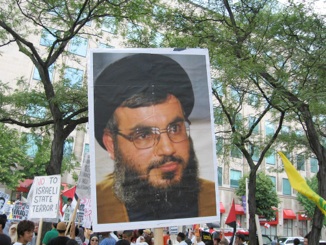
Wikimedia Commons
Hassan Nasrallah
Secretary-General (head) of Hezbollah
Bibliography
Veteran Intelligence Professionals for Sanity: Memorandum for the President, ‘War with Iran’
Giora Eiland, ‘Israel’s Military Option’
Gwynne Dyer, ‘Attacking Iran: US Options’.
Philip Giraldi, ‘A Cakewalk Against Iran’.
Podcasts
There are many podcasts available on the present situation. The last mentioned, a debate hosted by Al Jazeera, is particularly interesting.
http://www.youtube.com/watch?v=KeMIOdR0Zdg&feature=related
http://www.youtube.com/watch?v=K3Gzlh4V21g&NR=1
http://www.youtube.com/watch?v=cH9Pyf9XTYo&feature=related
‘If Arabs do not change their attitude and will continue with war, they will be expelled from there forever, just because Israel is militarily stronger. After all, isn't it how things are decided in gentile world? If other nations will decide to interfere on behalf of Arabs, Israel would have to use her nuclear arsenal. You should understand that we are fed up with you, guys, and if we have to go down we will, only we will take all of you with us. Remember Gideon? Zealots? Masada? We'll do it again. So, back off or die. There are no more choices.’
Private correspondence: a Russo-American Zionist writing to a British man whom I know.